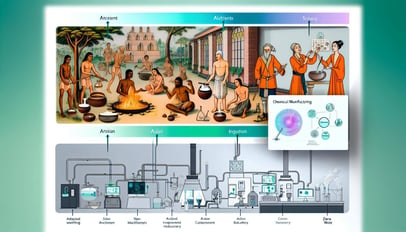Smart Factories and Connected Production Lines
The pursuit of efficiency and productivity is ceaseless in chemical manufacturing. Operations Directors bear the responsibility of optimizing processes, reducing costs, and ensuring seamless operations. In this age of technological advancements, the concept of smart factories and connected production lines has emerged as a beacon of hope, promising to revolutionize the way chemical manufacturing facilities operate.
In this blog, we look into the significance of this paradigm shift and explore how integration between advanced planning and enterprise resource planning (ERP) systems, such as PlanetTogether and leading platforms like SAP, Oracle, Microsoft, Kinaxis, and Aveva, can elevate manufacturing operations to new heights.

The Evolution of Manufacturing
Historically, chemical manufacturing has been characterized by siloed processes, fragmented data systems, and manual interventions. However, the rise of Industry 4.0 technologies has ushered in a new era of manufacturing, marked by connectivity, automation, and data-driven decision-making.
Smart factories leverage a plethora of technologies such as the Internet of Things (IoT), artificial intelligence (AI), machine learning (ML), and advanced analytics to create an interconnected ecosystem where machines, processes, and humans collaborate seamlessly.

The Benefits of Smart Factories
Enhanced Efficiency: By harnessing real-time data from sensors embedded in production equipment, smart factories enable proactive maintenance, minimize downtime, and optimize resource utilization. Operations Directors can leverage predictive analytics to forecast demand, adjust production schedules dynamically, and mitigate supply chain disruptions effectively.
Improved Quality Control: Through continuous monitoring and feedback loops, connected production lines facilitate stringent quality control measures, thereby reducing defects, minimizing rework, and enhancing customer satisfaction. Advanced analytics algorithms can detect anomalies in production parameters, enabling swift corrective actions to maintain product integrity.
Cost Reduction: Smart factories streamline operations, eliminate bottlenecks, and optimize energy consumption, leading to substantial cost savings. By integrating planning and execution systems seamlessly, Operations Directors can achieve economies of scale, negotiate better procurement deals, and minimize inventory holding costs.
Agile Responsiveness: In today's volatile business environment, agility is paramount. Smart factories empower Operations Directors to respond swiftly to changing market dynamics, customer preferences, and regulatory requirements. By orchestrating production schedules in real-time and synchronizing supply chain activities, organizations can adapt to disruptions without compromising efficiency.

Integration Between PlanetTogether and ERP Systems
A key enabler of smart manufacturing is the seamless integration between advanced planning systems like PlanetTogether and enterprise resource planning (ERP), supply chain management (SCM), and manufacturing execution systems (MES). These integrations bridge the gap between strategic planning and operational execution, fostering data consistency, process orchestration, and decision support capabilities.
SAP Integration: SAP's ERP suite offers robust functionalities for managing core business processes such as finance, procurement, and inventory management. By integrating PlanetTogether with SAP, Operations Directors can synchronize production plans with procurement schedules, align resource allocation with demand forecasts, and streamline order fulfillment processes.
Oracle Integration: Oracle's comprehensive suite of ERP, SCM, and MES solutions provides end-to-end visibility and control over manufacturing operations. Integration with PlanetTogether enables seamless data exchange between production planning, scheduling, and execution systems, facilitating synchronized decision-making and efficient resource utilization.
Microsoft Integration: Microsoft's Dynamics 365 platform offers a suite of cloud-based ERP and SCM applications that can be seamlessly integrated with PlanetTogether. By leveraging Microsoft's Power Platform, Operations Directors can create custom workflows, automate repetitive tasks, and derive actionable insights from production data in real-time.
Kinaxis Integration: Kinaxis RapidResponse is a leading supply chain planning platform that enables organizations to orchestrate their end-to-end supply chain processes. Integration with PlanetTogether enables Operations Directors to synchronize production plans with demand forecasts, optimize inventory levels, and mitigate supply chain risks proactively.
Aveva Integration: Aveva's MES solutions provide real-time visibility and control over manufacturing operations, enabling organizations to improve productivity, quality, and compliance. Integration with PlanetTogether facilitates seamless coordination between production planning and execution, enabling Operations Directors to optimize production schedules, track work-in-progress, and enforce standard operating procedures.

Best Practices for Successful Integration
Define Clear Objectives: Before embarking on the integration journey, it's crucial to define clear objectives, identify key performance indicators (KPIs), and establish success criteria. Whether the goal is to improve production efficiency, reduce lead times, or enhance product quality, aligning integration efforts with strategic priorities is essential.
Engage Stakeholders: Integration projects involve multiple stakeholders across different departments, including operations, IT, supply chain, and finance. Engaging stakeholders early in the process, soliciting their input, and addressing their concerns proactively can foster collaboration and buy-in, ensuring the success of the integration initiative.
Ensure Data Integrity: Data integrity is paramount in integration projects, as inaccurate or incomplete data can lead to erroneous decisions and operational inefficiencies. Establish data governance policies, implement data validation mechanisms, and leverage data cleansing tools to ensure the accuracy, consistency, and reliability of information exchanged between systems.
Leverage Standard APIs and Connectors: Many ERP, SCM, and MES vendors provide standard APIs and connectors that simplify the integration process. Leveraging these pre-built integrations can accelerate time-to-value, reduce development efforts, and minimize compatibility issues, enabling seamless communication between disparate systems.
Monitor Performance and Iterate: Integration is an iterative process that requires continuous monitoring, evaluation, and refinement. Establish key performance indicators (KPIs) to measure the impact of integration on operational metrics such as lead times, on-time delivery, and resource utilization. Monitor performance closely, solicit feedback from end-users, and iterate on the integration strategy to address any gaps or inefficiencies.
The advent of smart factories and connected production lines heralds a new era of efficiency, agility, and innovation in chemical manufacturing. By leveraging advanced planning systems like PlanetTogether and integrating them with leading ERP, SCM, and MES platforms, Operations Directors can unlock new levels of productivity, quality, and competitiveness.
However, successful integration requires careful planning, stakeholder engagement, and a commitment to data integrity. By embracing these principles and harnessing the power of integration, chemical manufacturing facilities can pave the way for a smarter, more sustainable future.
Are you ready to take your manufacturing operations to the next level? Contact us today to learn more about how PlanetTogether can help you achieve your goals and drive success in your industry.
Topics: PlanetTogether Software, Enhanced Efficiency, Integrating PlanetTogether, Improved Quality Control, Agile Responsiveness, End-to-End Visibility and Control, Production Data in Real-time, Chemical Manufacturing, Smart Factories




















LEAVE A COMMENT